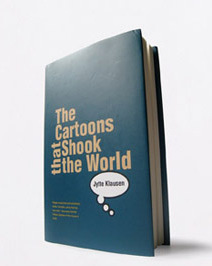 loading
loading
featuresNo middle groundYale University Press and the Danish cartoons  View full imageLate one October evening at SSS, after the lecture hall had been vetted by bomb-sniffing dogs and the people waiting on the steps were allowed in to hear the night's presentation, one man stopped at a table piled with copies of the speaker's book. Flipping through the pages of The Cartoons That Shook the World, he exclaimed, “Where are the cartoons? They don't even let you see the cartoons!” When a bystander said that the cartoons hadn't been included, he replied, “That shakes the world. Excision!” Cartoons is the most controversial book printed by the Yale University Press in many years, not because of what it contains but because of what it doesn't. The book, by Brandeis political scientist Jytte Klausen, is a scholarly study of exactly how cartoons of Muhammad, published by the Danish paper Jyllands-Posten in 2005, became the trigger for violent demonstrations in the Middle East and Africa—demonstrations that killed, by Klausen's estimate, up to 250 people. In her manuscript, submitted to the Yale Press last December, Klausen had included a reproduction of the newspaper page. The academic review panel and the Press's faculty committee approved it. But John Donatich, director of the Yale Press, had doubts. “After reading Jytte Klausen's manuscript last spring,” he wrote in a commentary for the Yale Alumni Magazine, “I picked up the phone and told her how much I admired the book but that I remained ambivalent about publishing the cartoons.” He consulted Yale's president and secretary. They in turn consulted experts in foreign affairs and Islamic studies. “We were counseled by very reliable people in the U.S., the UK, Pakistan, the Middle East,” says Yale president Richard C. Levin ’74PhD, “that the odds were high that a place as prominent as Yale republishing these cartoons would lead to violent demonstrations. We're firmly committed to free speech, but this was a case that presented a very unusual set of circumstances where the failure to exercise restraint could with reasonable likelihood have led to violence and potentially deaths.” This past July, Klausen was told the cartoons would not be part of her book. In August, someone told the New York Times. The issue exploded into a public controversy, with commentators in the National Review, the Atlantic, and newspapers across the country excoriating the Press for censorship. A group of alumni, including John R. Bolton ’70, ’74JD, former U.S. ambassador to the UN; and former presidential speechwriter David Frum ’82, ’82MA, signed a letter of protest by attorney Michael W. Steinberg ’74, asking Yale's trustees to overrule the Press and require a new edition of the book with images included. Some critics suggest that Yale excised the cartoons for fear of offending Muslim donors. The overwhelming majority of Yale's donations come from U.S. sources, but the university does have a few funders in Muslim countries. In addition, however, one of Yale's top priorities is to raise its global profile; as part of that effort it is actively seeking academic and other exchanges with institutions in the Islamic world. In September, as the Yale Press controversy roiled in the blogs, Yale hosted lectures by several Moroccan academics, the U.S. opening of an Islamic women's art exhibit, and a talk by the queen of Jordan. Asked whether Yale's international ambitions had entered the Yale Press discussions, Levin said some faculty “were concerned about, one, the damage [publication] might do to Yale's work in the Middle East and, two, the gratuitously insulting nature of the cartoons themselves. But we set those arguments aside, because you need a very high bar to take a decision like this.” Absent the threat of violence, “the Press would have published them.” Asked about the speculation over Arab funding, he said, “That was not a consideration. I found that insulting to the university. That was not even mentioned in the weeks of discussion.” The controversy is still playing out. Not only Klausen, but also Kurt Westergaard, the cartoonist who drew the most controversial of the Danish caricatures, gave a talk on campus. (Westergaard's talk was still more heavily guarded than Klausen's, with guests taken to the event in chartered buses and wanded before entry.) Some 40 alumni have signed on to Steinberg's letter. Levin and Yale's board of trustees have replied to Steinberg, reaffirming their decision not to publish, but inviting him and other signatories to meet for a conversation. The book at the center of the storm is a carefully researched academic monograph, in which Klausen details her findings that Muslims had a wide range of responses to the cartoons—not the universal revulsion Westerners might expect—which varied according to local religious tradition and history, and especially local politics. But in the debate over the book, there is almost no middle ground. At her October lecture, Klausen was challenged by some audience members for acceding to the Press's decision instead of withdrawing her book altogether; and she was challenged by Joseph Cumming of the Divinity School—who said he knew people who had been killed after a previous republication—for making light of the idea that her book might trigger violence. To put the arguments in this debate before the alumni, the Yale Alumni Magazine commissioned a series of commentaries from experts in different fields and of different opinions. From Newsweek International's Fareed Zakaria ’86 (“Yale Press was confronted with a clear threat of violence and loss of life”) to Cary Nelson, president of the American Association of University Professors (the decision “trespasses on academic freedom”), they are all available in full at http://www.yalealumnimagazine.com/extras/yup/. Several are excerpted here.
|
|